new to the gluten free journey?
new to the gluten free journey?

 Should Celiacs or Those with Gluten Sensitivity Be More Worried About Covid?
Should Celiacs or Those with Gluten Sensitivity Be More Worried About Covid?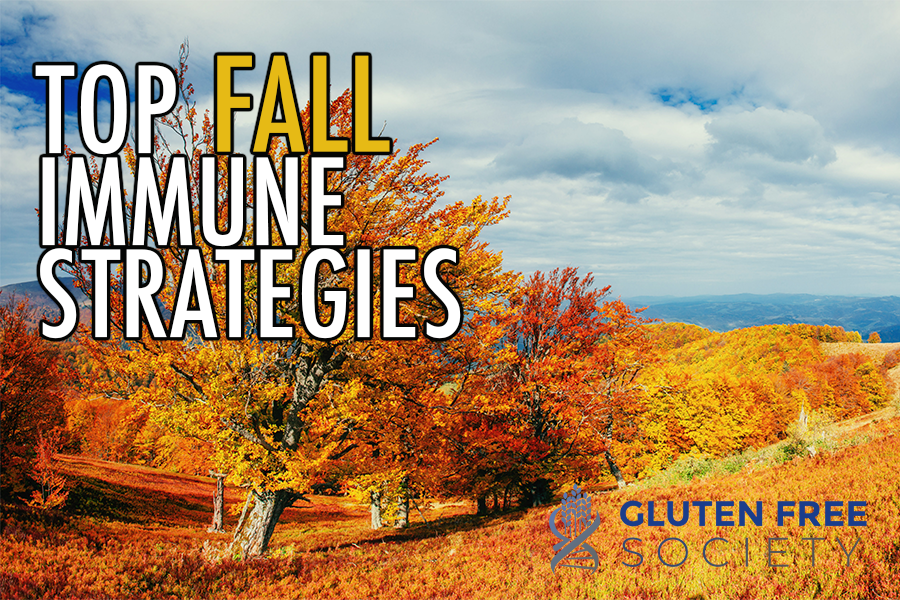
 Vitamin D is the most potent immune-boosting agent known to man. It’s needed to mount a strong immune response when your body is faced with a threat. So without vitamin D, your immune response may be weak, which could make infections more likely or more severe.
The best way to get vitamin D is from the sun. Because you have a form of cholesterol in your skin that’s converted to vitamin D when exposed to ultraviolet light.
You can get vitamin D from food. But food isn’t a rich source of vitamin D, unless you’re a fan of liver.
Now, as the seasons change, it may become more difficult to bathe in the sun in some parts of the world. And this is why vitamin D levels begin to drop in the fall, which also coincides with cold and flu season. This is why I recommend high dose vitamin D therapy this time of year (under the supervision of a licensed healthcare professional). To make sure your vitamin D levels are strong as we move into cooler and less sunny months.
However, there’s no substitute for the sun. So when you can get out in the sun, do it! Not just for vitamin D. The sun also helps your body produce melatonin.
Most people might not realize this, but melatonin is also an immune-boosting agent. Plus, it’s a powerful antioxidant. And antioxidants protect your immune system and support your ability to fight off infections.
Sleep regulation is another important function of melatonin. When you’re outside in the sun, your eyes are exposed to natural light. This sends a message to your brain helping to ensure that you melatonin levels are optimized. Remember that healthy melatonin supports healthy sleep.
Many people spend most of their time indoors under artificial light. Staring at artificially lit screens. But artificial light doesn’t trigger the production of melatonin.
So if you’re not outside in daylight, you’re not producing melatonin. And this is why so many people have trouble sleeping. And when you struggle with sleep, your immune system also struggles.
I recommend being outside 2 to 3 hours a day. If you’re fair-skinned, get as much direct sun as you can without burning. However, continue to spend time outdoors under a shade. You’ll still be getting sunlight in your eyes to help produce melatonin.
If spending time outdoors during daylight hours is impossible for you, then I recommend using what’s called a happy lamp. It’s a light source that you put on your desk about 2 feet from your face. The goal is to let the light hit your eyes for at least 20 minutes first thing in the morning, which will help trigger the production of melatonin.
Another benefit of being outside is known as grounding. Touching the magnetic field of the earth with bare feet. Evidence suggests it may boost your immune system, promote sleep, reduce pain, and reduce stress. It also increases your exposure to beneficial bacteria in the dirt and soil that also support your immune system.
Recently, I talked about the “hygiene hypothesis.” The idea that these days we’re “too clean” and not exposed to enough everyday germs. This is certainly true today as we’re being told to stay inside and routinely use hand sanitizer and disinfect every surface. For a full break down on this topic, watch this video.
This is important because everyday germs challenge our immune systems. And these daily challenges are what strengthens our immune systems. They better prepare them for more dangerous threats.
So don’t just go outside. I also recommend playing in the dirt. Start a garden. Branch out from your usual path to increase the diversity of microorganisms you come in contact with.
The last point I want to make about being outdoors is that according to the EPA, indoor air is 100 to 200 times more polluted than outdoor air. This may not be true if you live next door to a chemical factory, but in general, this is true due to the chemicals used in products to build homes. Chemicals in paint. Chemicals sprayed on carpet, furniture, and other upholstery. Chemicals from cleaning products and more.
These chemicals emit volatile organic compounds (VOCs), which can suppress your immune system. In many cases, these chemicals can’t escape from your home. So they just recirculate and present a constant burden.
You can use a HEPA filtration system to help pull VOCs out of your indoor air. And I do recommend this. I also recommend opening your front and back doors or windows when the weather permits to allow the flow of fresh air to pull VOCs outside. But being outside in the fresh air for a couple hours a day is always best.
Vitamin D is the most potent immune-boosting agent known to man. It’s needed to mount a strong immune response when your body is faced with a threat. So without vitamin D, your immune response may be weak, which could make infections more likely or more severe.
The best way to get vitamin D is from the sun. Because you have a form of cholesterol in your skin that’s converted to vitamin D when exposed to ultraviolet light.
You can get vitamin D from food. But food isn’t a rich source of vitamin D, unless you’re a fan of liver.
Now, as the seasons change, it may become more difficult to bathe in the sun in some parts of the world. And this is why vitamin D levels begin to drop in the fall, which also coincides with cold and flu season. This is why I recommend high dose vitamin D therapy this time of year (under the supervision of a licensed healthcare professional). To make sure your vitamin D levels are strong as we move into cooler and less sunny months.
However, there’s no substitute for the sun. So when you can get out in the sun, do it! Not just for vitamin D. The sun also helps your body produce melatonin.
Most people might not realize this, but melatonin is also an immune-boosting agent. Plus, it’s a powerful antioxidant. And antioxidants protect your immune system and support your ability to fight off infections.
Sleep regulation is another important function of melatonin. When you’re outside in the sun, your eyes are exposed to natural light. This sends a message to your brain helping to ensure that you melatonin levels are optimized. Remember that healthy melatonin supports healthy sleep.
Many people spend most of their time indoors under artificial light. Staring at artificially lit screens. But artificial light doesn’t trigger the production of melatonin.
So if you’re not outside in daylight, you’re not producing melatonin. And this is why so many people have trouble sleeping. And when you struggle with sleep, your immune system also struggles.
I recommend being outside 2 to 3 hours a day. If you’re fair-skinned, get as much direct sun as you can without burning. However, continue to spend time outdoors under a shade. You’ll still be getting sunlight in your eyes to help produce melatonin.
If spending time outdoors during daylight hours is impossible for you, then I recommend using what’s called a happy lamp. It’s a light source that you put on your desk about 2 feet from your face. The goal is to let the light hit your eyes for at least 20 minutes first thing in the morning, which will help trigger the production of melatonin.
Another benefit of being outside is known as grounding. Touching the magnetic field of the earth with bare feet. Evidence suggests it may boost your immune system, promote sleep, reduce pain, and reduce stress. It also increases your exposure to beneficial bacteria in the dirt and soil that also support your immune system.
Recently, I talked about the “hygiene hypothesis.” The idea that these days we’re “too clean” and not exposed to enough everyday germs. This is certainly true today as we’re being told to stay inside and routinely use hand sanitizer and disinfect every surface. For a full break down on this topic, watch this video.
This is important because everyday germs challenge our immune systems. And these daily challenges are what strengthens our immune systems. They better prepare them for more dangerous threats.
So don’t just go outside. I also recommend playing in the dirt. Start a garden. Branch out from your usual path to increase the diversity of microorganisms you come in contact with.
The last point I want to make about being outdoors is that according to the EPA, indoor air is 100 to 200 times more polluted than outdoor air. This may not be true if you live next door to a chemical factory, but in general, this is true due to the chemicals used in products to build homes. Chemicals in paint. Chemicals sprayed on carpet, furniture, and other upholstery. Chemicals from cleaning products and more.
These chemicals emit volatile organic compounds (VOCs), which can suppress your immune system. In many cases, these chemicals can’t escape from your home. So they just recirculate and present a constant burden.
You can use a HEPA filtration system to help pull VOCs out of your indoor air. And I do recommend this. I also recommend opening your front and back doors or windows when the weather permits to allow the flow of fresh air to pull VOCs outside. But being outside in the fresh air for a couple hours a day is always best.
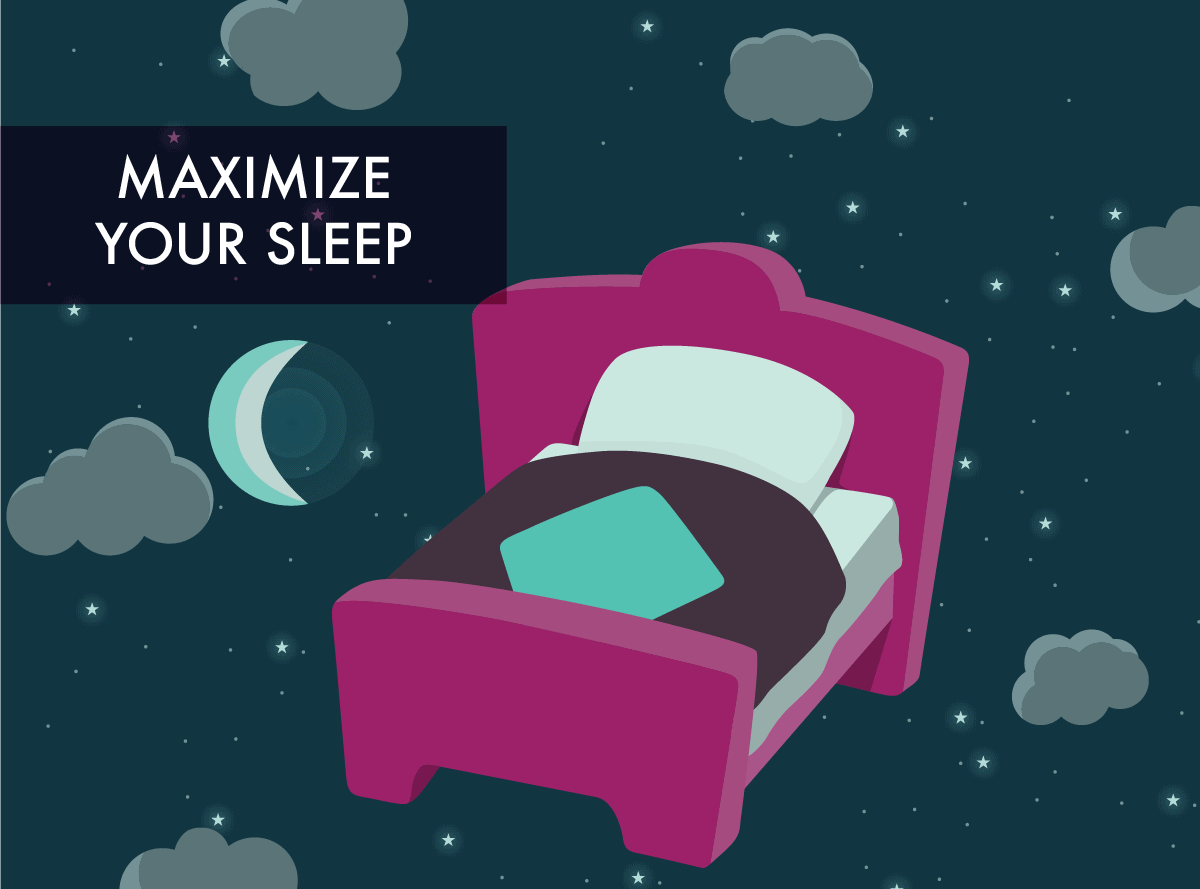 I just discussed the benefits of sunlight. How it’s needed for your body to produce melatonin, which induces sleep. So now I want to discuss why sleep is important when it comes to your immune system.
Sleep modulates stress. More specifically, sleep resets your stress hormones.
Hormonal balance is essential for optimal health. Your hormone levels fluctuate at different times of the month as well as during the day. And a balance exists between melatonin and your stress hormone cortisol.
Under normal circumstances, melatonin begins to be released shortly after dark. Your levels peak around midnight. And as you’re sleeping, they begin to decrease so you’ll eventually wake-up.
On the other hand, your cortisol levels should be low after dark. They then begin to rise early in the morning to assist with waking up. And they peak around 8:30 AM.
These hormonal changes are designed to help you fall asleep easily, sleep soundly, and wake-up feeling refreshed and energized.
However, when you don’t sleep, you disrupt your natural cortisol cycle. For example, instead of your cortisol rising in the morning and decreasing throughout the day, it may stay high all day. Or be low in the morning and high at night. Making it hard for you to sleep no matter how hard you try. Instead, you’re left feeling wired and tired.
If your cortisol is raised for too long, it will also raise your blood sugar. And chronically high blood sugar creates AGEs (advanced glycation end products), which make your blood and the proteins and hormones in your blood sticky. So they don’t function as well and make you age faster.
Cortisol is also a catabolic hormone, which means it can break down muscle tissue. Therefore, chronically high cortisol can lead to a loss of muscle tone and mass.
High blood sugar, AGEs, and muscle loss can weaken your immune system and make it harder to fight off infections.
Overtime, as stress continues to eat away at you, your cortisol levels begin to drop. Because your body can’t keep up. And at that point, you feel tired. Really tired. Like you can’t get out of bed. Plus, you’re less likely to get outside as well as exercise, which makes things worse.
Fortunately, much of this can be avoided with a good night’s sleep.
10:00 PM to 2:00 AM is the most critical time frame for sleep. It’s the time when our bodies are being repaired and our hormones are being reset. So I don’t recommend going to bed at 10:00 PM. Instead, I recommend being asleep by 10:00 PM.
This also doesn’t mean that you should wake up at 2:00 AM. Preferably you sleep longer. But I definitely recommend sleeping during this 4-hour window to modulate your stress, maximize hormone productivity, regulate your blood sugar, and slow down the aging process. So your immune system is strong and healthy.
I just discussed the benefits of sunlight. How it’s needed for your body to produce melatonin, which induces sleep. So now I want to discuss why sleep is important when it comes to your immune system.
Sleep modulates stress. More specifically, sleep resets your stress hormones.
Hormonal balance is essential for optimal health. Your hormone levels fluctuate at different times of the month as well as during the day. And a balance exists between melatonin and your stress hormone cortisol.
Under normal circumstances, melatonin begins to be released shortly after dark. Your levels peak around midnight. And as you’re sleeping, they begin to decrease so you’ll eventually wake-up.
On the other hand, your cortisol levels should be low after dark. They then begin to rise early in the morning to assist with waking up. And they peak around 8:30 AM.
These hormonal changes are designed to help you fall asleep easily, sleep soundly, and wake-up feeling refreshed and energized.
However, when you don’t sleep, you disrupt your natural cortisol cycle. For example, instead of your cortisol rising in the morning and decreasing throughout the day, it may stay high all day. Or be low in the morning and high at night. Making it hard for you to sleep no matter how hard you try. Instead, you’re left feeling wired and tired.
If your cortisol is raised for too long, it will also raise your blood sugar. And chronically high blood sugar creates AGEs (advanced glycation end products), which make your blood and the proteins and hormones in your blood sticky. So they don’t function as well and make you age faster.
Cortisol is also a catabolic hormone, which means it can break down muscle tissue. Therefore, chronically high cortisol can lead to a loss of muscle tone and mass.
High blood sugar, AGEs, and muscle loss can weaken your immune system and make it harder to fight off infections.
Overtime, as stress continues to eat away at you, your cortisol levels begin to drop. Because your body can’t keep up. And at that point, you feel tired. Really tired. Like you can’t get out of bed. Plus, you’re less likely to get outside as well as exercise, which makes things worse.
Fortunately, much of this can be avoided with a good night’s sleep.
10:00 PM to 2:00 AM is the most critical time frame for sleep. It’s the time when our bodies are being repaired and our hormones are being reset. So I don’t recommend going to bed at 10:00 PM. Instead, I recommend being asleep by 10:00 PM.
This also doesn’t mean that you should wake up at 2:00 AM. Preferably you sleep longer. But I definitely recommend sleeping during this 4-hour window to modulate your stress, maximize hormone productivity, regulate your blood sugar, and slow down the aging process. So your immune system is strong and healthy.
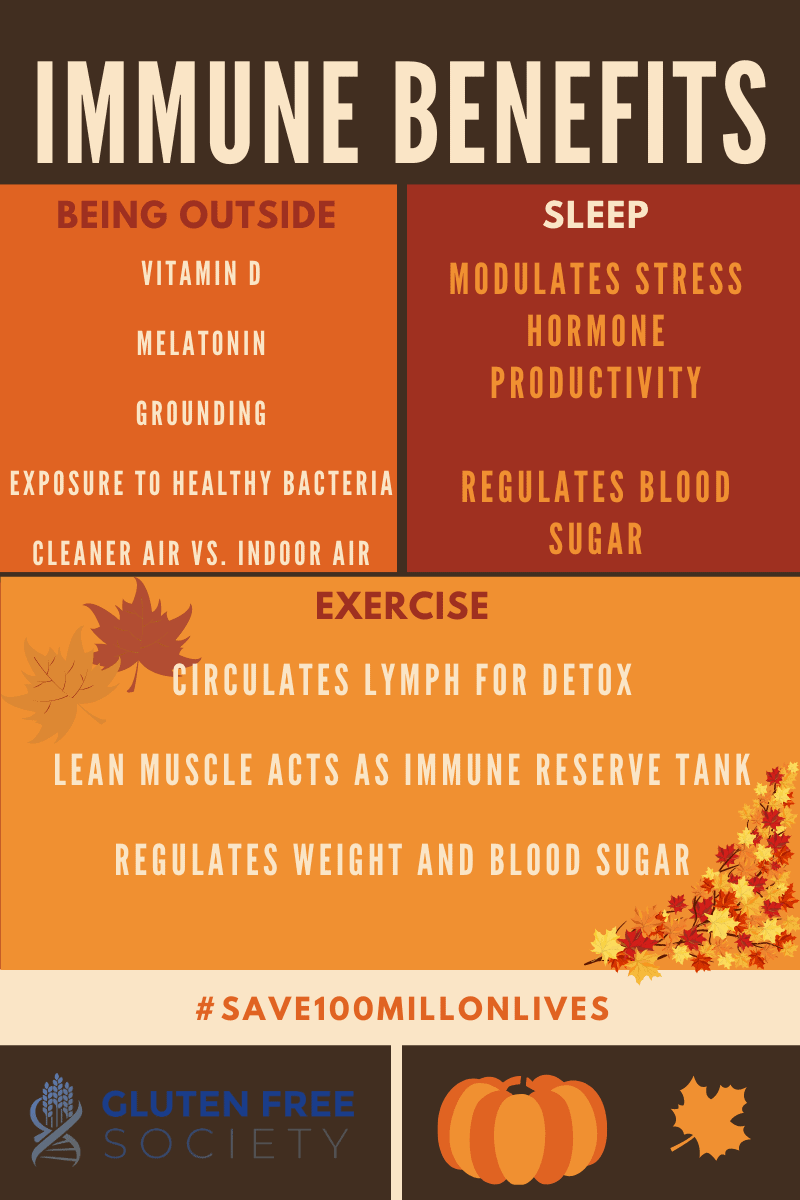
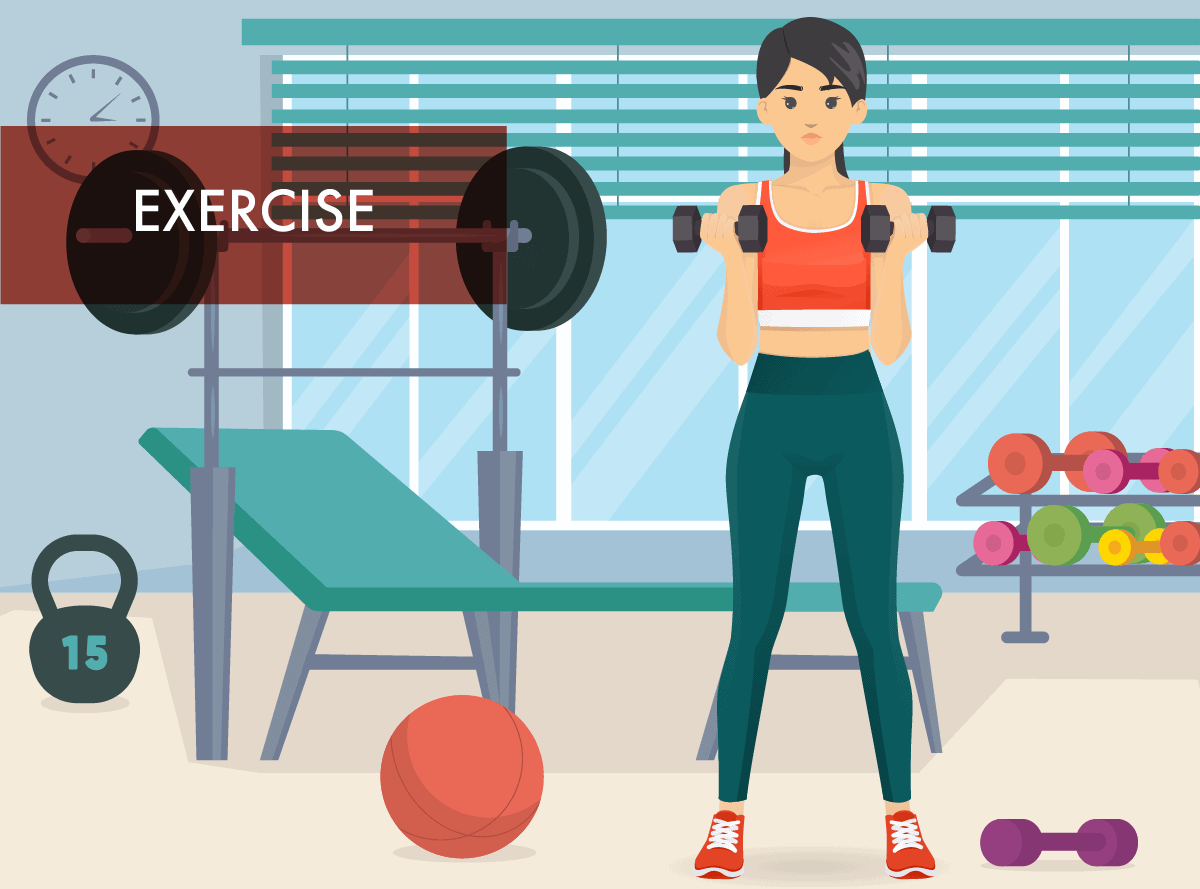 Exercise is probably the most ignored component when it comes to building a strong immune system. In my opinion, a huge mistake health officials made was shutting down gyms. And suggesting that people exercise while wearing a mask, which depletes your body of oxygen.
One of the biggest benefits of exercise is that it circulates your lymph, a fluid that carries infection-fighting white blood cells throughout your body.
This is important because your lymphatic system doesn’t have a pump like your heart has to circulate blood. So exercise acts like a pump for your lymphatic system, which also helps your body eliminate toxins and waste.
So if you’re sitting all day, your lymphatic system won’t flow properly and toxins can accumulate in your lymphatic fluid. And this puts tremendous stress on your immune system.
The good news is you don’t need a gym to exercise. You can do bodyweight exercises, such as push-ups, pull-ups, sit-ups, planks, lunges, and squats. You can buy a set of dumbbells or resistance bands that don’t take up much room to add some extra weight. You can also get outside and walk, jog, or ride your bike.
In addition, I recommend some form of high intensity interval training. If you don’t know where to start in this area, consider hiring a professional to help you.
If you work at a desk all day, you could also invest in a treadmill desk. I have one and it allows me to move my body while I’m on the phone for hours at a time.
While walking helps keep your lymphatic system flowing, bodyweight exercises will help build lean muscle mass. And muscle mass is important when your immune system is under attack. It acts as a reserve tank of amino acids to build antibodies that fight off infections. So the more muscle mass you have, the stronger and more resilient you will be if exposed to a virus.
Exercise also helps regulate your weight and blood sugar. Remember high blood sugar causes AGEs, which accelerates aging. They also reduce the productivity of your hormones as well as proteins in your blood known as immunoglobulins, which help your immune system combat foreign invaders.
Exercise is probably the most ignored component when it comes to building a strong immune system. In my opinion, a huge mistake health officials made was shutting down gyms. And suggesting that people exercise while wearing a mask, which depletes your body of oxygen.
One of the biggest benefits of exercise is that it circulates your lymph, a fluid that carries infection-fighting white blood cells throughout your body.
This is important because your lymphatic system doesn’t have a pump like your heart has to circulate blood. So exercise acts like a pump for your lymphatic system, which also helps your body eliminate toxins and waste.
So if you’re sitting all day, your lymphatic system won’t flow properly and toxins can accumulate in your lymphatic fluid. And this puts tremendous stress on your immune system.
The good news is you don’t need a gym to exercise. You can do bodyweight exercises, such as push-ups, pull-ups, sit-ups, planks, lunges, and squats. You can buy a set of dumbbells or resistance bands that don’t take up much room to add some extra weight. You can also get outside and walk, jog, or ride your bike.
In addition, I recommend some form of high intensity interval training. If you don’t know where to start in this area, consider hiring a professional to help you.
If you work at a desk all day, you could also invest in a treadmill desk. I have one and it allows me to move my body while I’m on the phone for hours at a time.
While walking helps keep your lymphatic system flowing, bodyweight exercises will help build lean muscle mass. And muscle mass is important when your immune system is under attack. It acts as a reserve tank of amino acids to build antibodies that fight off infections. So the more muscle mass you have, the stronger and more resilient you will be if exposed to a virus.
Exercise also helps regulate your weight and blood sugar. Remember high blood sugar causes AGEs, which accelerates aging. They also reduce the productivity of your hormones as well as proteins in your blood known as immunoglobulins, which help your immune system combat foreign invaders.
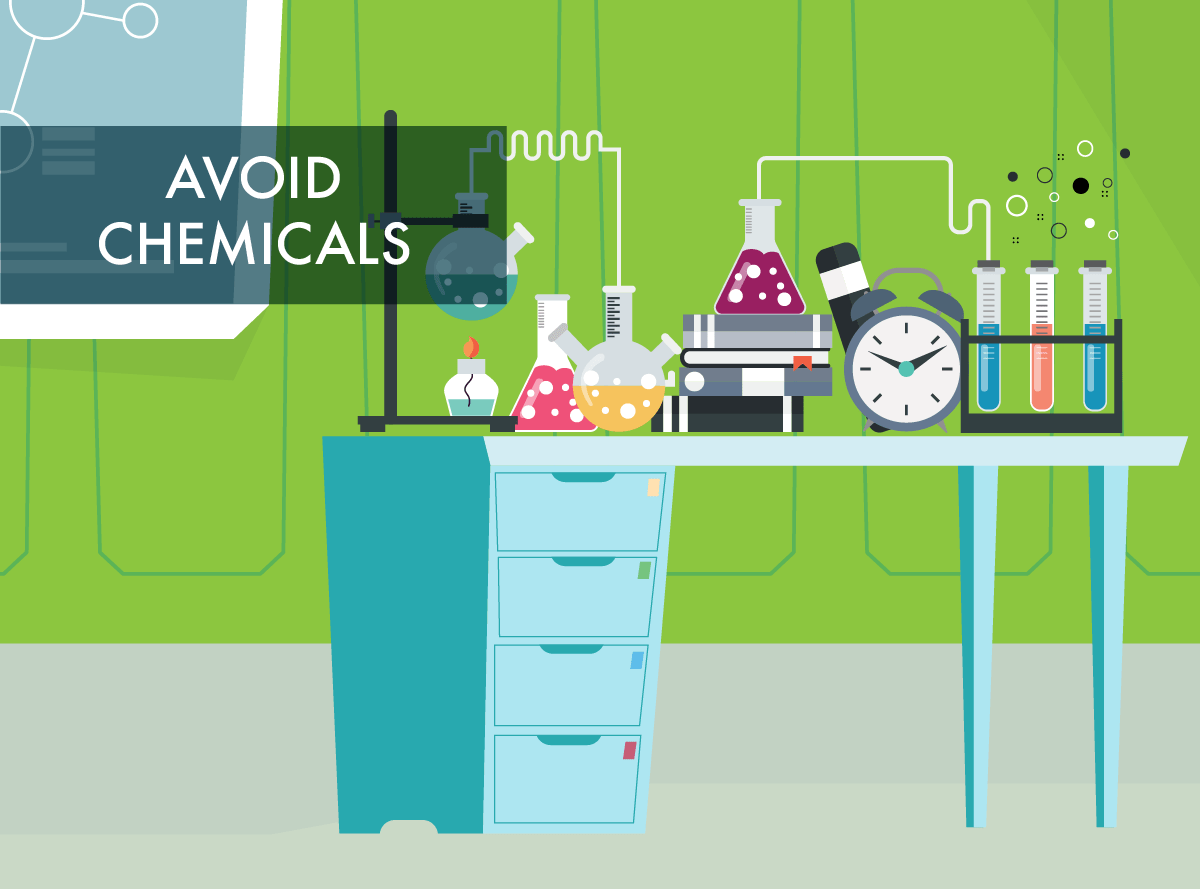 Pesticides and herbicides can act like hormones in your body, stress your detoxification systems, and weaken your immune system. So eating organic food is a great way to reduce your exposure.
However, pesticides are also used on home gardens, sport fields, and community playgrounds. So you don’t want to be around when these things are being sprayed. And it’s a good idea to switch to more natural forms of pest control in your own backyard.
Heavy metals (e.g., lead, mercury, and cadmium) are also something we’re exposed to on a daily basis that can affect our immune system. And they’re often in our drinking water. Maybe you remember the case of Flint, Michigan. Where residents were getting sick because their water was contaminated with lead leaching from old solder used to weld the pipes.
So while your city uses filtration systems to remove harmful microorganisms from your water, their filtration systems do not remove heavy metals. Therefore, I recommend filtering your tap water. And using a filter that specifically addresses heavy metals and pesticides, which does NOT include Brita filters. Most Brita filters only remove the odor and taste of chlorine.
Many people are also exposed to mercury through their silver amalgams (a.k.a. fillings) in their mouth. Over time, they break down and release mercury in your body. So I recommend scheduling an appointment with a biological dentist to have your amalgams checked and removed if problematic.
Cadmium and arsenic are found in many grain-based foods, including rice. So many people that eat crackers and pasta made from rice as a gluten-free substitute are consuming large amounts of heavy metals that can suppress your immune system.
Mycotoxins, produced by mold, suppress your immune system and are known to contribute to the development of cancer. They’re commonly found in grains (e.g., wheat and corn) and processed foods made with them. They’re also found in homes with water damage. So I recommend avoiding grains and addressing any water-related issues in your home.
We should also avoid exposure to petrochemicals emitted from cars. So when you’re driving on the highway, roll up your windows and turn on the AC. Because your AC has a filter on it.
Pesticides and herbicides can act like hormones in your body, stress your detoxification systems, and weaken your immune system. So eating organic food is a great way to reduce your exposure.
However, pesticides are also used on home gardens, sport fields, and community playgrounds. So you don’t want to be around when these things are being sprayed. And it’s a good idea to switch to more natural forms of pest control in your own backyard.
Heavy metals (e.g., lead, mercury, and cadmium) are also something we’re exposed to on a daily basis that can affect our immune system. And they’re often in our drinking water. Maybe you remember the case of Flint, Michigan. Where residents were getting sick because their water was contaminated with lead leaching from old solder used to weld the pipes.
So while your city uses filtration systems to remove harmful microorganisms from your water, their filtration systems do not remove heavy metals. Therefore, I recommend filtering your tap water. And using a filter that specifically addresses heavy metals and pesticides, which does NOT include Brita filters. Most Brita filters only remove the odor and taste of chlorine.
Many people are also exposed to mercury through their silver amalgams (a.k.a. fillings) in their mouth. Over time, they break down and release mercury in your body. So I recommend scheduling an appointment with a biological dentist to have your amalgams checked and removed if problematic.
Cadmium and arsenic are found in many grain-based foods, including rice. So many people that eat crackers and pasta made from rice as a gluten-free substitute are consuming large amounts of heavy metals that can suppress your immune system.
Mycotoxins, produced by mold, suppress your immune system and are known to contribute to the development of cancer. They’re commonly found in grains (e.g., wheat and corn) and processed foods made with them. They’re also found in homes with water damage. So I recommend avoiding grains and addressing any water-related issues in your home.
We should also avoid exposure to petrochemicals emitted from cars. So when you’re driving on the highway, roll up your windows and turn on the AC. Because your AC has a filter on it.
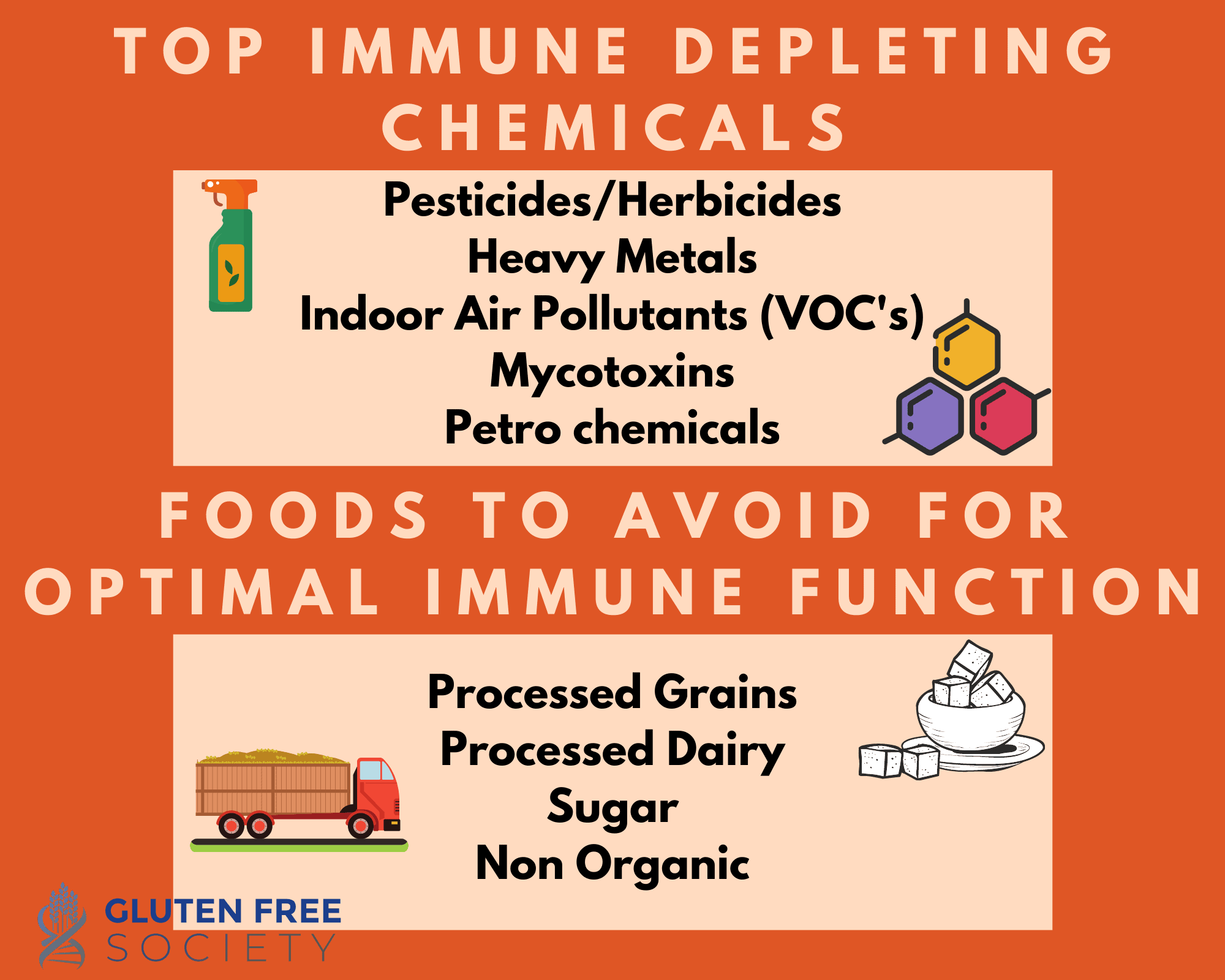
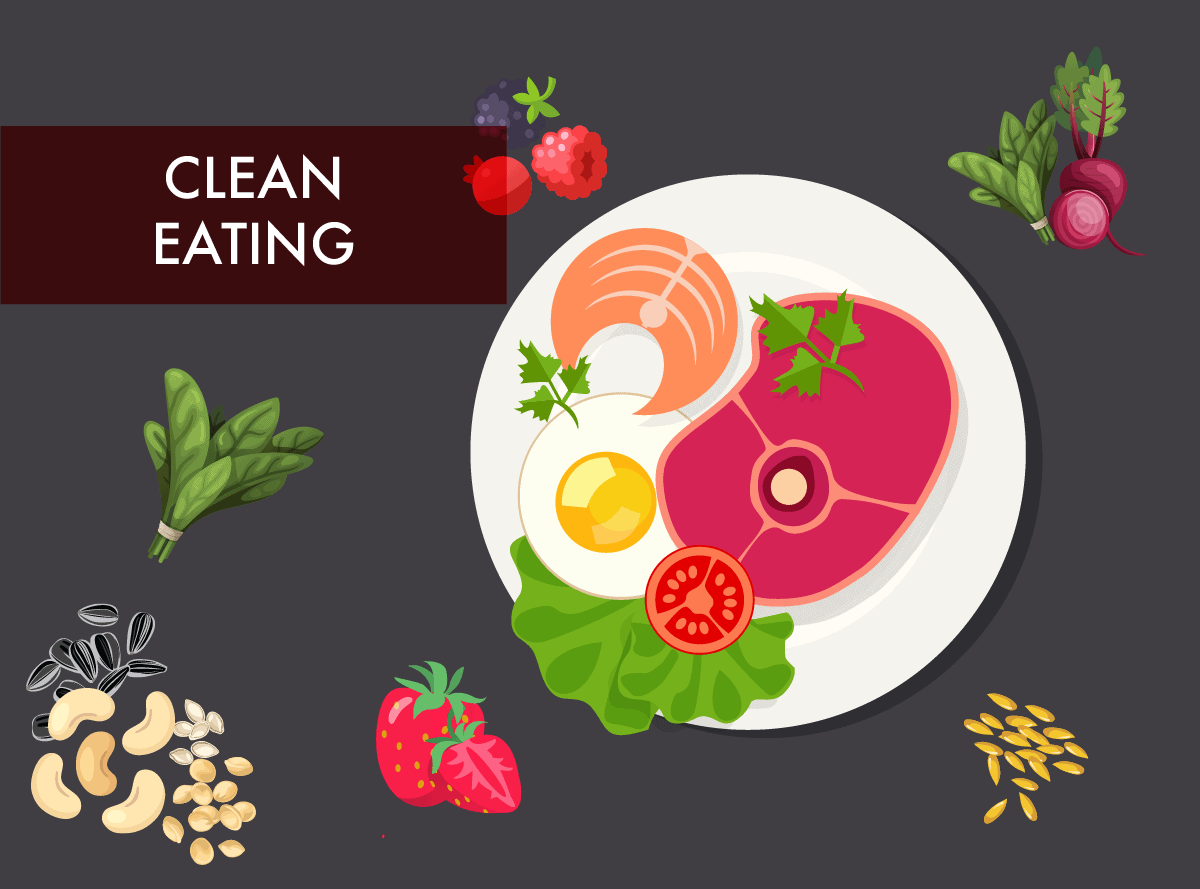 There are many immune-suppressing chemicals in our food supply. Not just pesticides and mycotoxins. There’s also artificial food additives, such as food dyes, flavorings, preservatives, emulsifiers, thickeners, etc.
Processed grain-based foods are the most adulterated and immunosuppressive foods available. Processed dairy and sugar are also high on the list.
Therefore, I recommend filling your plate with whole foods. Proteins from pasture-raised animals. Wild seafood. Lots of fruits and veggies. And nuts and seeds.
What you cook your food on also matters. Non-stick cookware is sprayed with chemicals to give it that non-stick coating (e.g., Teflon). However, when heated, it releases toxic fumes. It also breaks down over time and can contaminate your food. Teflon has also been associated with an increase risk for celiac disease.
It’s also interesting that the blue surgical masks many people are wearing these days are sprayed with a teflon-based chemical. This means people are walking around with masks on to protect them from a virus. But at the same time, they’re constantly exposing themselves to a toxic chemical that can weaken their immune system.
Teflon and similar chemicals have also been linked to an increased risk of celiac disease, an autoimmune disease of the small intestine.
So I recommend cooking with stainless steel, cast iron, or glass. And if you’re wearing a mask, avoid the surgical masks. Opt for a cloth mask that hasn’t been treated with chemicals.
There are many immune-suppressing chemicals in our food supply. Not just pesticides and mycotoxins. There’s also artificial food additives, such as food dyes, flavorings, preservatives, emulsifiers, thickeners, etc.
Processed grain-based foods are the most adulterated and immunosuppressive foods available. Processed dairy and sugar are also high on the list.
Therefore, I recommend filling your plate with whole foods. Proteins from pasture-raised animals. Wild seafood. Lots of fruits and veggies. And nuts and seeds.
What you cook your food on also matters. Non-stick cookware is sprayed with chemicals to give it that non-stick coating (e.g., Teflon). However, when heated, it releases toxic fumes. It also breaks down over time and can contaminate your food. Teflon has also been associated with an increase risk for celiac disease.
It’s also interesting that the blue surgical masks many people are wearing these days are sprayed with a teflon-based chemical. This means people are walking around with masks on to protect them from a virus. But at the same time, they’re constantly exposing themselves to a toxic chemical that can weaken their immune system.
Teflon and similar chemicals have also been linked to an increased risk of celiac disease, an autoimmune disease of the small intestine.
So I recommend cooking with stainless steel, cast iron, or glass. And if you’re wearing a mask, avoid the surgical masks. Opt for a cloth mask that hasn’t been treated with chemicals.
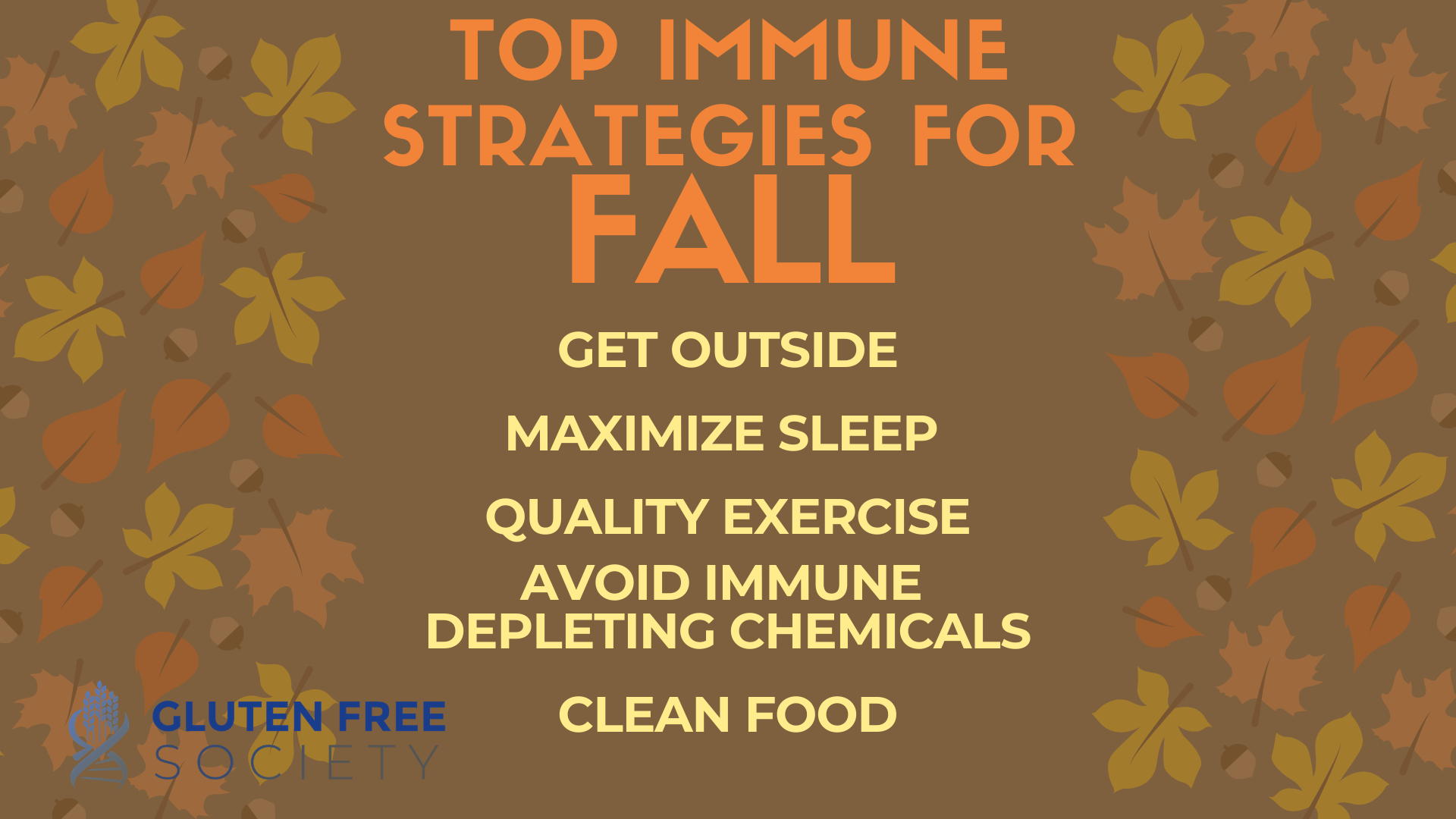 There’s a lot of talk about staying home and wearing masks to protect yourself and your loved ones. But these strategies do nothing to strengthen your immune system. In fact, I would argue they’re weakening it. Especially if you’re not getting outside in the sun and fresh air. If you’re spending more time on the couch and less time exercising. And if you’re eating more processed foods and drinking more alcohol to cope with the stress of the pandemic.
Don’t rely solely on loading up on vitamins D, C, A, zinc, NAC, and quercetin. Though effective for supporting immune function, they’re not a more effective substitute for creating healthy habits. Your body still needs a daily dose of sun, fresh air, sleep, exercise, and healthy food.
Always looking out for you,
Dr. Osborne – The Gluten Free Warrior
What are you doing to keep your immune system healthy right now? Comment below…
There’s a lot of talk about staying home and wearing masks to protect yourself and your loved ones. But these strategies do nothing to strengthen your immune system. In fact, I would argue they’re weakening it. Especially if you’re not getting outside in the sun and fresh air. If you’re spending more time on the couch and less time exercising. And if you’re eating more processed foods and drinking more alcohol to cope with the stress of the pandemic.
Don’t rely solely on loading up on vitamins D, C, A, zinc, NAC, and quercetin. Though effective for supporting immune function, they’re not a more effective substitute for creating healthy habits. Your body still needs a daily dose of sun, fresh air, sleep, exercise, and healthy food.
Always looking out for you,
Dr. Osborne – The Gluten Free Warrior
What are you doing to keep your immune system healthy right now? Comment below…
Written and medically reviewed by Dr. Peter Osborne. Updated on October 17, 2020
Stay up-to-date with the latest articles, tips, recipes and more.

*These statements have not been evaluated by the Food and Drug Administration. This product is not intended to diagnose, treat, cure or prevent any disease.
If you are pregnant, nursing, taking medication, or have a medical condition, consult your physician before using this product.
The entire contents of this website are based upon the opinions of Peter Osborne, unless otherwise noted. Individual articles are based upon the opinions of the respective author, who retains copyright as marked. The information on this website is not intended to replace a one-on-one relationship with a qualified health care professional and is not intended as medical advice. It is intended as a sharing of knowledge and information from the research and experience of Peter Osborne and his community. Peter Osborne encourages you to make your own health care decisions based upon your research and in partnership with a qualified health care professional.
4 Responses
Walking the dog in nature. Also with your research follow a grain free and dairy free diet. I was having no success with thyroid medication until l followed your diet. Also l keep my vitamin levels boosted with supplements.. Thanks for all your input.
So good to hear the No Grain No Pain diet is working for you, Susan!
Thanks for sharing your experience!
All the best,
Dr. O
Thank you for all this great information and research. I’ve not been able to regulate my thyroid in 4 years despite everything I’ve tried. I’m going to buy your book.Also what pasta or crackers can be eaten if gluten free if not rice?
Pasta – we have a vegetable spiralizer. Put some butternut squash into it and make little “spaghettis” with it. Sauté with some oil and garlic.
Crackers – easily made using nut/seed flours.